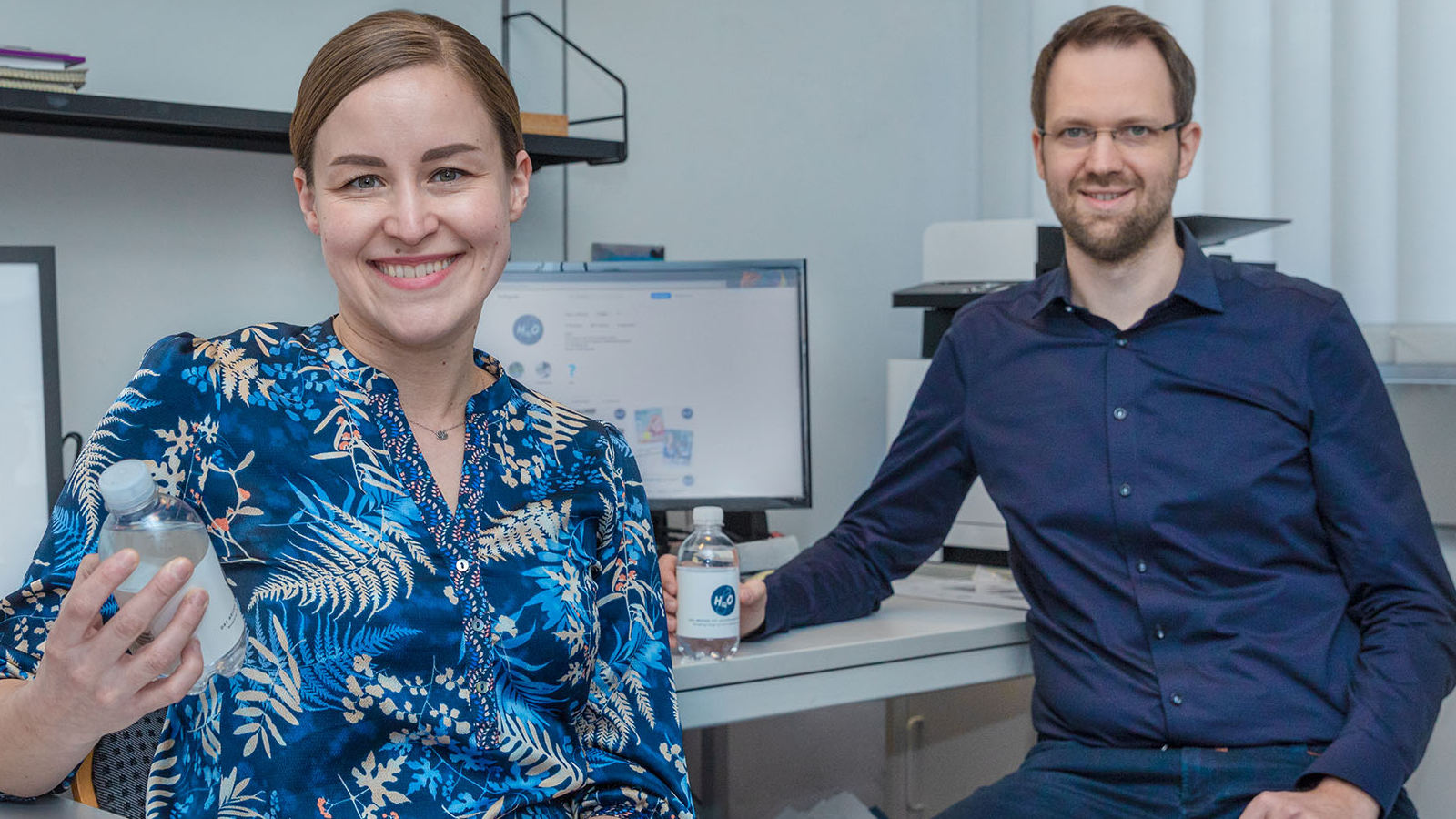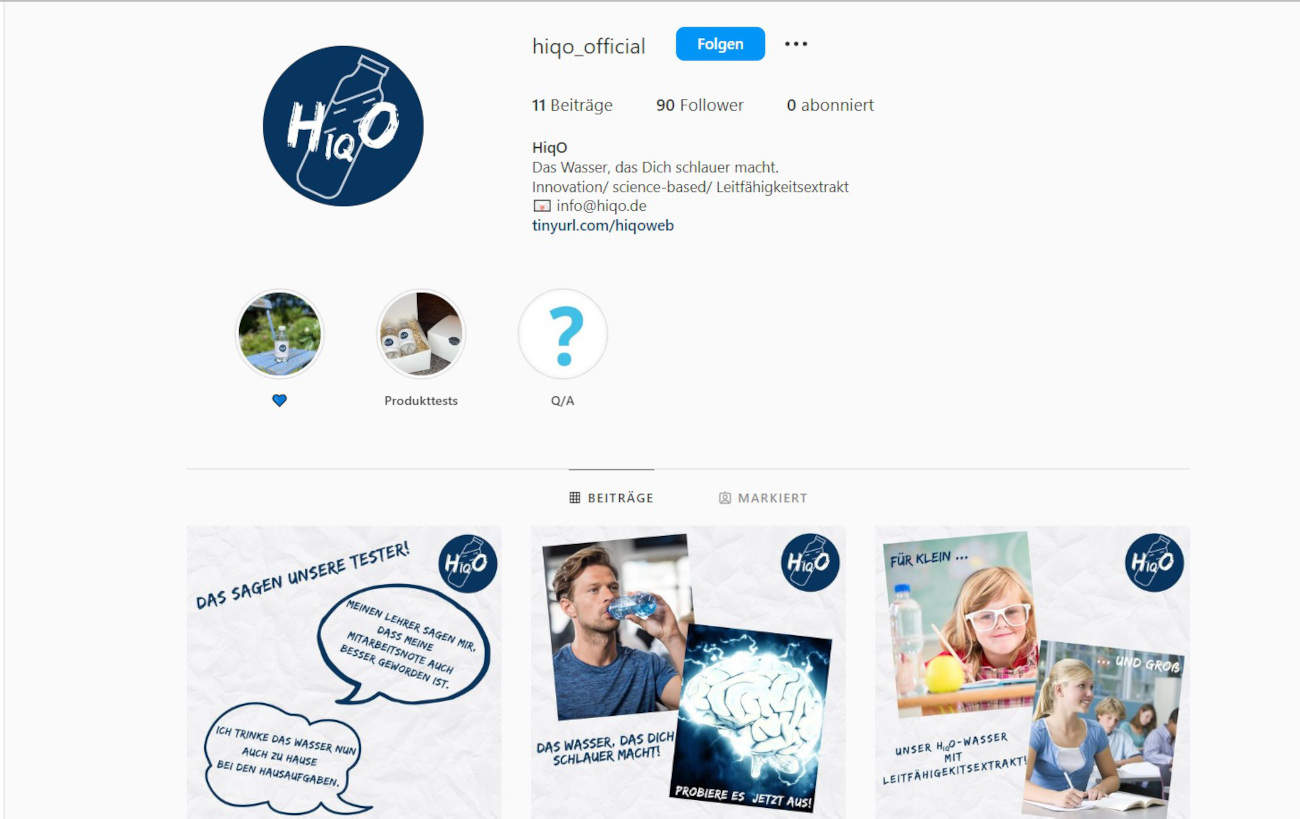
© Matej Meza / Universität Bremen
HIQO – Fake Water for Chemistry Lessons
Award-Winning Concept Bridges Science and Social Media
Young people are often confronted with false information on social media platforms like Instagram and TikTok. This applies not only to political and social issues, but also to science-related ones. Chemistry didactics Dr. Nadja Belova and Dr. Moritz Krause have developed a teaching unit to make young people aware of this. The focus is on a fake product that the students debunk together.
A different sort of chemistry lesson. The teacher has brought a special kind of water for her class. What looks like ordinary tap water is enriched with a special conductivity extract, she explains. This helps the brain cells connect more closely together, enabling the consumer to concentrate more effectively. The water even has its own Instagram channel, which the young people watch together.
But on closer inspection, some of them become suspicious. Why can they only find limited information on the studies that allegedly prove the effectiveness of the water? Are incomprehensible technical terms meant to conceal the lack of evidence for the effect of the water? Finally, the teacher reveals the secret: HIQO, the water with the conductivity extract, is a completely fictitious product. She then talks to her students about criteria that will make it easier for them to identify false information on social media in the future.
Award-Winning Teaching Concept
Chemistry didactics Dr. Nadja Belova and Dr. Moritz Krause received the Polytechnik Prize special award at the end of 2022 for the concept of this lesson. Concepts for the use of digital media in scientific and technical subjects were recognized for their excellence by the Stiftung Polytechnische Gesellschaft. Krause and Belova have been dealing with this set of topics for a long time. Both of them completed their doctorates on this subject under Ingo Eilks, professor of chemistry didactics at the Faculty of Biology and Chemistry at the University of Bremen.
© Stiftung Polytechnische Gesellschaft
Nadja Belova is currently a permanent lecturer at the University of Bremen, for example conducting research on critical media education in science teaching and supervising student research projects in this context. Moritz Krause not only works as a teacher of biology and chemistry at the Schulzentrum Geschwister Scholl Gymnasiale Oberstufe Bremerhaven, he is also a part-time lecturer at the University of Bremen. In this role, he helps university students develop teaching concepts for their theses and put them to practical tests.
Social Media: Uncharted Territory in Chemistry Class
The two researchers developed the teaching unit on HIQO as part of a grant from the Joachim Herz Stiftung’s Didaktik:digital program. It offers teachers and researchers financial support and opportunities for mutual exchange in order to develop teaching modules or research projects on the use of digital media in science teaching. According to Krause, this is an area where a lot has been done in recent years. “This is not least due to the fact that tablets were purchased for all school students in the state of Bremen as a result of the coronavirus pandemic.”
“Digital media are predominantly present in science teaching as an aid, hardly as a subject of instruction”
Filming experiments or creating digital test protocols has become a normal part of chemistry lessons for many young people at this point. “However, digital media are predominantly present in science teaching as an aid and are hardly addressed as a subject of instruction,” notes Belova. And from their point of view, this is a major deficit. After all, young people are confronted every day on Instagram and Tiktok with promises or misinformation that have a scientific background. For example, when it comes to the supposedly harmful effect of fluoride in toothpaste. Or fasting cures, which are supposed to purify the body.
Learning with Emotional Experiences
The researchers developed the teaching unit on HIQO to counteract this deficit. They designed the teaching concept and created the bottle design together. “We also created an initial draft for an Instagram account, but the students immediately realized that it wasn’t real,” says Krause. So he and Belova set up a new account and got the students to help them design it.

© Nadja Belova und Moritz Krause
The teaching module is based on the subject of ions, which is usually taught in the ninth grade in Bremen. “When salts are dissolved in water, ions – that is, electrically charged atoms or molecules – are released, and the solution becomes electrically conductive,” explains Belova. Nerve cells in the brain are also surrounded by ions, through which information is passed on. With that background in mind, it may initially seem plausible to many young people that a certain extract could make the brain perform more effectively. When the fake is then discovered, the surprise is even greater – an effect Krause and Belova deliberately leverage. “It’s easier for us to remember information when it’s linked to emotions,” says Krause.
Reducing Obstacles with Professional Development
Krause and Belova developed a website for the students so they can benefit from the teaching module for as long as possible. On it, they cite criteria that can be used to identify false information on social media: Are trusted sources listed? When scientific studies are referenced, are the study conditions, such as the number of participants, stated? Is the information matter-of-fact, or does it deliberately stir up emotions?
© Nadja Belova und Moritz Krause
Belova and Krause evaluated the concept with 106 young people. Using a questionnaire, they examined the ability to reflect critically on scientific information. The conclusion was that the lesson participants performed significantly better in this matter than the other young people from a control group. “Scientific studies also show that such teaching units have to be repeated so that the young people can benefit from them in the long term,” says Belova. One obstacle is that not all teachers want to address social media in the classroom. Especially those who hardly use social media themselves are skeptical. Belova discovered this in an interview study with three university students. For this reason, she and Krause offer professional development on digital media, in which they also address the teaching unit.
Another obstacle: “Many teachers think in a very subject-oriented way, focusing on the next test or the Abitur exams,” says Krause. But there is hardly any need for social media skills there. Not least for this reason, the two researchers developed the teaching unit in such a way that it can be implemented within a relatively short period of time – for instance a double lesson before the holidays. “Young people should experience that chemistry has something to do with their daily lives,” says Belova. She is convinced that once you understand this relevance, you are more likely to be enthusiastic about the subject.